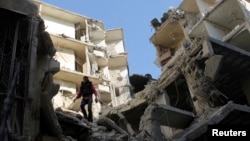BEIRUT —
Syria's opposition coalition said on Tuesday it would not attend international peace talks in Geneva next month if President Bashar al-Assad's forces continued a fierce air raid campaign on the northern city of Aleppo.
More than 300 people had been killed in a week of air raids on Syria's biggest city, many of them by so-called barrel bombs dropped from helicopters, the Syrian Observatory for Human Rights, a pro-opposition monitoring group, said on Monday.
Syrian authorities say they are battling rebels in control of parts of the city, once Syria's business hub. But rights groups have condemned the use of barrel bombs - oil drums or cylinders packed with explosives and metal fragments - in particular as an indiscriminate form of bombardment.
The opposition's Syrian National Coalition said in a statement that it “cannot in good conscience participate in peace talks in Geneva as Assad regime forces continue to bombard the city of Aleppo and surrounding areas for the ninth consecutive day”.
World powers, particularly the United States and Russia, have been working to bring the opposition and Assad to negotiations, dubbed “Geneva 2”, due to begin on Jan.22. The aim is to agree on a transitional government to bring Syria out of a 2-1/2-year conflict that has killed more than 100,000 people.
Syria's turmoil began as a popular protest movement against four decades of Assad family rule but descended into an armed conflict.
Opposition figure Monzer Akbik, chief of staff to Coalition President Ahmed Jarba, called on foreign powers to act to stop the Aleppo attacks.
“The lack of international consensus in stopping this latest war crime is directly emboldening Assad to significantly escalate violence against the Syrian people,” he said in the statement.
More than 300 people had been killed in a week of air raids on Syria's biggest city, many of them by so-called barrel bombs dropped from helicopters, the Syrian Observatory for Human Rights, a pro-opposition monitoring group, said on Monday.
Syrian authorities say they are battling rebels in control of parts of the city, once Syria's business hub. But rights groups have condemned the use of barrel bombs - oil drums or cylinders packed with explosives and metal fragments - in particular as an indiscriminate form of bombardment.
The opposition's Syrian National Coalition said in a statement that it “cannot in good conscience participate in peace talks in Geneva as Assad regime forces continue to bombard the city of Aleppo and surrounding areas for the ninth consecutive day”.
World powers, particularly the United States and Russia, have been working to bring the opposition and Assad to negotiations, dubbed “Geneva 2”, due to begin on Jan.22. The aim is to agree on a transitional government to bring Syria out of a 2-1/2-year conflict that has killed more than 100,000 people.
Syria's turmoil began as a popular protest movement against four decades of Assad family rule but descended into an armed conflict.
Opposition figure Monzer Akbik, chief of staff to Coalition President Ahmed Jarba, called on foreign powers to act to stop the Aleppo attacks.
“The lack of international consensus in stopping this latest war crime is directly emboldening Assad to significantly escalate violence against the Syrian people,” he said in the statement.





